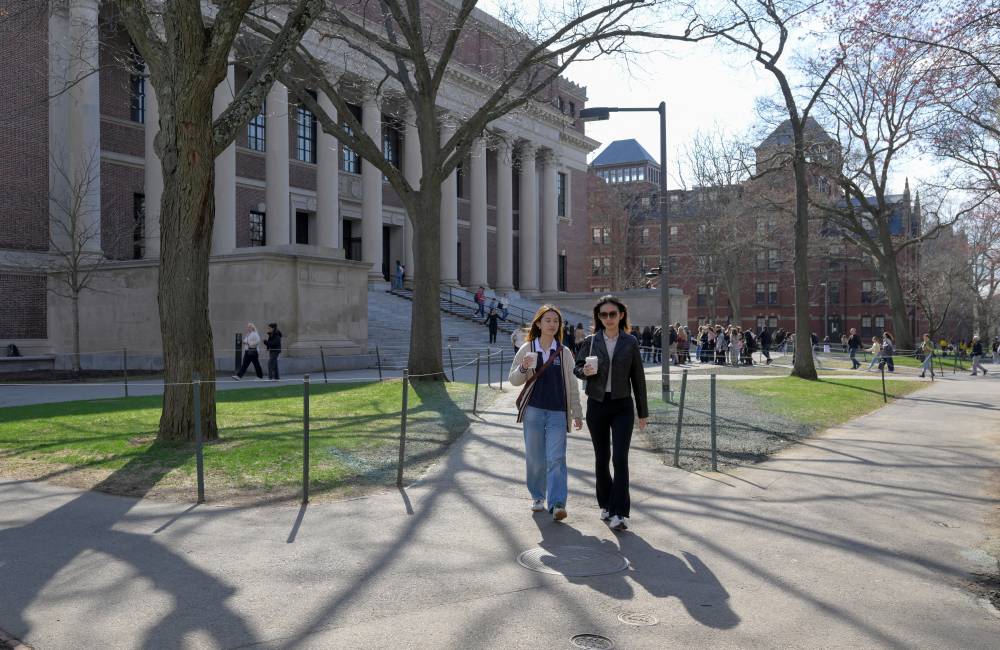Trump admin bars Harvard from enrolling foreign students

BOSTON—US President Donald Trump’s administration on Thursday revoked Harvard University’s ability to enroll international students and is forcing current foreign students to transfer to other schools or lose their legal status.
The administration has also threatened to expand the crackdown to other colleges.
The decision marked a significant escalation of the Trump administration’s campaign against the elite Ivy League university in Cambridge, Massachusetts, which has emerged as one of his most prominent institutional targets.
The move came after Harvard refused to provide information demanded by Homeland Security Secretary Kristi Noem about some foreign student visa holders at the university, her department said.
Student records
Noem has ordered her department to terminate Harvard University’s Student and Exchange Visitor Program certification effective for the 2025-2026 school year, after she accused the university of “fostering violence, antisemitism and coordinating with the Chinese Communist Party.”
Harvard said the move—which affects thousands of students—was illegal and amounted to retaliation.
Harvard enrolled nearly 6,800 international students in the 2024-2025 school year—amounting to 27 percent of its total enrollment, according to university statistics.
In 2022, Chinese nationals were the biggest group of foreign students at 1,016, university figures showed.
Furthermore, several Chinese “princelings,” as children of the elite in the ruling Communist Party are known, have attended Harvard over the past two decades, including President Xi Jinping’s daughter, Xi Mingze.
After the Chinese are students from Canada, India, South Korea, Britain, Germany, Australia, Singapore and Japan.
In a recent letter to Harvard, Noem gave the university “the opportunity” to regain its certification by turning over within 72 hours a raft of records about foreign students—including any video or audio of their protest activity in the past five years.
She said “It is a privilege, not a right, for universities to enroll foreign students and benefit from their higher tuition payments to help pad their multibillion-dollar endowments.”
‘International credibility’
The Chinese Foreign Ministry said Beijing will safeguard the legitimate rights and interests of its overseas students and scholars.
Mao Ning, spokesperson for the ministry, also said US actions will undoubtedly affect its “image and international credibility.”
Harvard student Zhang said “the Chinese community definitely feels like a more targeted entity compared to other groups.”
The 24-year-old, who is pursuing a doctorate in physics, agreed to be interviewed but declined to give his last name.
Zhang said many among Harvard’s Chinese students are worried about their visa status and internship prospects though others believe the school is likely to win any legal battles.
Yet other Chinese students at Harvard were suddenly canceling flights home on Friday and seeking legal advice on staying in the United States.
“Our teachers have sent us an email saying the school is actively working hard on a response within the next 72 hours and aims to negotiate with the government,” said Teresa, a Chinese postgraduate student at Harvard Kennedy School.
Zhang Kaiqi, a master’s student in public health, had packed his luggage and souvenirs ready for a Friday flight back to China. But upon hearing the news, he urgently canceled the expensive flight, losing his internship at an American nongovermental organization in China.
“I was sad and irritated. For a moment I thought it was fake news,” the 21-year-old said.
The most anxious among the Chinese students at Harvard are those with summer jobs as research assistants tied to their visa status, crucial for future Ph.D. applications, he said.
As others digested Thursday’s order, two Chinese students said they were added to WhatsApp groups in which panicked foreign students were frantically sharing legal advice on their immigration status.
One provided a transcript from such a chat group that showed a lawyer advising students not to leave the country or use domestic air travel, and wait for official announcements from the school.
Calling the government’s action “unlawful,” Harvard said it was “fully committed” to educating foreign students.
Earlier ruling
“This retaliatory action threatens serious harm to the Harvard community and our country, and undermines Harvard’s academic and research mission,” the university said in a statement.
Congressional Democrats also denounced the revocation, with Maryland Rep. Jamie Raskin calling it an “intolerable attack on Harvard’s independence and academic freedom.”
Trump has already frozen some $3 billion in federal grants to Harvard in recent weeks, leading the university to sue to restore the funding.
In a separate lawsuit related to Trump’s efforts to terminate the legal status of hundreds of foreign students across the United States, a federal judge ruled on Thursday that the administration could not end their status without following proper regulatory procedures.
It was not immediately clear how that earlier ruling would now affect the action against Harvard.
In an interview with Fox News’ “The Story with Martha MacCallum,” Noem was asked if she was considering similar moves at other universities, including Columbia University in New York.
“Absolutely, we are,” Noem said. “This should be a warning to every other university to get your act together.”
Since taking office in January pledging a wide-ranging immigration crackdown, Trump has undertaken an extraordinary effort to revamp private colleges and schools across the United States, claiming they foster anti-American, Marxist and “radical left” ideologies.
The Republican president also criticized Harvard for hiring prominent Democrats for teaching or leadership positions.
Reuters, the news and media division of Thomson Reuters, is the world’s largest multimedia news provider, reaching billions of people worldwide every day. Reuters provides business, financial, national and international news to professionals via desktop terminals, the world's media organizations, industry events and directly to consumers.





















